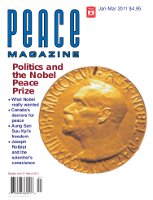
Peace Magazine Jan-Mar 2011, page 7. Some rights reserved.
Search for other articles by Rene Wadlow here
Can the November 2010 elections in Burma (known as Myanmar to its leaders) and the end of the house arrest of Aung San Suu Kyi be steps on the long road to democracy or are they mere public relations gestures? It is impossible to say if any of the newly elected members of the Parliament will show an independent spirit and make efforts to raise real questions.
Nearly all the candidates were hand-picked by the ruling military: they were not members of a political party, nor did they have any experience in politics or legislation. They were picked because it was thought that they would go along with anything the military wanted. The military had 25 percent of the parliamentary seats reserved for serving military personnel written into the Constitution, and many of the other seats are held by military men who retired to become civilians for the election.
The military leadership created for the elections a political party—the Union Solidarity Development Party—but the party had no members prior to the election campaign, no discussions of issues and no ideology other than self-interest. While this is not a likely pool from which to draw independent-minded reformers, there might be some hidden individuals who will speak out for the welfare of the people.
Likewise, the military created some ethnic-based parties to represent the national minorities who live on the frontiers. Again, these parties did not exist prior to the elections, and there is not much indication that they will exist long now that the elections are past. However, one never knows if, having created structures, these structures might take on a life of their own. These ethnic representatives, who represented no one but themselves, might become spokespersons for the real aspirations of the brutalized minorities. Over 40 percent of the 55 million population are national minorities who live in higher areas along the frontiers with Thailand, China, India, and Bangladesh. The creation of a Parliament with some real debate along with meaningful decentralization of administration could help bring an end to intermittent armed conflict between the army and the minorities.
However, if the Parliament does not discuss and act in visible, positive ways, the ethnic minorities may decide that the democratic structures are really a sham and that armed insurgency is the only path forward.
The military officials at the top of the power ladder have few options. Personally, they are putting their money in Singapore banks, but the real economy of the country is in the hands of ethnic Chinese. The Chinese government watches the situation closely. Basically, it wants stability and wants to avoid a backlash against Chinese merchants, as there had been in 1962 when the military came to power. At that time the economy was largely controlled by Indian merchants; their goods were nationalized and they were expelled from Burma.
The military, which has been in direct control of the country from 1958 to 1960 and then from 1962 to the present had first chosen as its motto “The Burmese Road to Socialism.” This Burmese Road led from a relatively prosperous country at Independence on 4 January 1948 to efforts in 1987 to be admitted to a UN-sponsored “club” of the Least Developed Countries. The end of the Road to Socialism after 1988 has led to the now untitled road of officer-led corruption and private Chinese-owned stores, hotel, trade and a small amount of manufacturing.
The military are now speaking of “The Road to Democracy,” but there are no obvious signposts. There are an estimated 2000 political prisoners, most linked to the National League for Democracy of Aung San Suu Kyi. Many educated Burmese have left the country. The National League for Democracy has never been able to function as a real political party, and much of the leadership was already old and worn out from earlier efforts. Aung San Suu Kyi provided a young and fresh face in the late 1980s, but few of her generation were in positions of party leadership. Her long years of house arrest have not improved the situation.
Burma merits our close attention in the coming months. Leadership for reform may come from unexpected sources. The September-October 2007 campaign of Burma’s Buddhist monks to bring about change nonviolently awakened a civilian population long held in fear by the governing military. The monks marched behind large banners saying “Love and Kindness must win over everything.” The monk-led demonstrations showed that opposition could come from unlikely sources. It is not impossible that the new parliament will take its title as the “representative of the people” seriously.
René Wadlow is representative to the UN in Geneva for the Association of World Citizens.

Peace Magazine Jan-Mar 2011, page 7. Some rights reserved.
Search for other articles by Rene Wadlow here